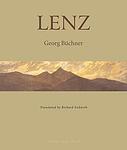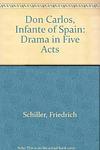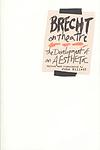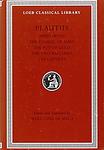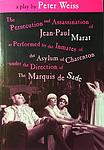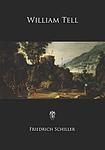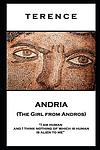The Greatest Roman, German "Plays" Books of All Time
Click to learn how this list is calculated.
This list represents a comprehensive and trusted collection of the greatest books. Developed through a specialized algorithm, it brings together 305 'best of' book lists to form a definitive guide to the world's most acclaimed books. For those interested in how these books are chosen, additional details can be found on the rankings page.
Genres
Plays are a category of literature that consists of written works intended for performance on stage. They typically feature dialogue between characters and are structured into acts and scenes. Plays can be comedic, tragic, or a combination of both, and often explore themes such as love, power, and morality. They are meant to be performed by actors in front of an audience, and can be enjoyed both as written works and as live performances.
Countries
Date Range
Reading Statistics
Click the button below to see how many of these books you've read!
Download
If you're interested in downloading this list as a CSV file for use in a spreadsheet application, you can easily do so by clicking the button below. Please note that to ensure a manageable file size and faster download, the CSV will include details for only the first 500 books.
Download-
1. Faust by Johann Wolfgang von Goethe
The book is a tragic play in two parts that tells the story of a scholarly man named Faust, who becomes dissatisfied with his life and makes a pact with the devil, Mephistopheles. In exchange for unlimited knowledge and worldly pleasures, Faust agrees to give his soul to Mephistopheles after death. The narrative explores themes of ambition, despair, love, and redemption, ultimately leading to Faust's salvation.
The 84th Greatest Book of All Time -
2. Mother Courage and Her Children by Bertolt Brecht
Set against the backdrop of the Thirty Years' War, the book tells the story of a canteen woman, Mother Courage, who pulls her cart with her three children across war-torn Europe. It explores her struggles and survival tactics as she tries to profit from the war while keeping her children safe. The narrative is a profound critique of war and its consequences, highlighting the human cost of conflict and the often futile search for prosperity and security in a chaotic world.
The 1731st Greatest Book of All Time -
3. The Resistible Rise of Arturo Ui by Bertolt Brecht
"The Resistible Rise of Arturo Ui" is a satirical play that uses the rise of a fictional 1930s Chicago mobster, Arturo Ui, to parallel the rise of Adolf Hitler in Nazi Germany. The narrative is a critique of those who allowed Hitler to come to power, emphasizing that his rise was indeed resistible. The play explores themes of power, corruption, manipulation, and the dangers of complacency, showcasing the destructive potential of unchecked ambition and the failure of society to prevent the ascent of dangerous individuals.
The 1735th Greatest Book of All Time -
4. Galileo by Bertolt Brecht
This play delves into the life of the renowned Italian scientist, Galileo Galilei, who challenged the church's belief in a geocentric universe. It explores his struggles against the Catholic Church, his recantation, and the consequences of his actions on his life and those around him. The narrative also examines the conflict between science and religion, the ethics of scientific discovery, and the price of truth.
The 1888th Greatest Book of All Time -
5. Spring Awakening by Frank Wedekind
The book is a provocative and controversial play that delves into the tumultuous emotional landscape of adolescence. Set in late 19th-century Germany, it follows a group of teenagers as they navigate the complexities of sexuality, authority, and rebellion. The narrative exposes the repressive and hypocritical nature of the society that stifles the natural desires and questions of the young characters, leading to tragic consequences. Through its candid exploration of themes such as sexual awakening, suicide, abortion, and the critique of the educational system, the play challenges the audience to confront the damaging effects of ignorance and the urgent need for open communication and understanding between generations.
The 2713th Greatest Book of All Time -
6. The Caucasian Chalk Circle by Bertolt Brecht
The play is a parable set in the Soviet Union that explores themes of justice, class struggle, and morality through the story of Grusha, a servant girl who risks her life to protect an abandoned child of noble birth during a time of revolution. As the child grows, a dispute over his custody arises, leading to a trial presided over by a wily, unconventional judge named Azdak. The trial's resolution hinges on the titular chalk circle test, which ultimately reveals the true nature of parental love and the importance of putting the needs of the child first. The narrative is a commentary on the social and political issues of the time, advocating for a society that prioritizes the welfare of its most vulnerable members.
The 2782nd Greatest Book of All Time -
7. The Good Person of Szechwan by Bertolt Brecht
"The Good Person of Szechwan" is a parable play that explores the difficulty of maintaining one's morals and goodness in a corrupt and exploitative world. The story revolves around a kind-hearted prostitute who struggles to be a good person under the harsh realities of life in Szechwan. When three gods visit the city in search of a good person, they find only her willing to help them. However, to survive, she must adopt a ruthless alter ego, leading to a complex exploration of morality, identity, and societal pressures.
The 3394th Greatest Book of All Time -
8. Lenz by Georg Buchner
"Lenz" is a novella that explores the mind of Jakob Michael Reinhold Lenz, a historical figure and playwright, during his descent into madness. The narrative presents a detailed account of Lenz's mental state as he struggles with depression, anxiety, and hallucinations while living in the mountains. It provides a profound look into the human psyche and the effects of isolation and mental illness.
The 3796th Greatest Book of All Time -
9. Nathan the Wise by Gotthold Ephraim Lessing
"Nathan the Wise" is a 18th-century play that explores religious tolerance and interfaith understanding. The story is set in Jerusalem during the Third Crusade and revolves around Nathan, a wealthy Jewish merchant, who is renowned for his wisdom and generosity. The narrative explores themes of religious tolerance as Nathan interacts with a Templar knight, a Christian patriarch, and the Muslim sultan Saladin. The story culminates with the revelation that the main characters, despite their different faiths, are all part of the same family, thus promoting a message of shared humanity and religious coexistence.
The 4489th Greatest Book of All Time -
10. Don Carlos: Infante of Spain, a Drama in Five Acts by Friedrich Schiller
"Don Carlos: Infante of Spain, a Drama in Five Acts" is a historical play that portrays the intense political and personal conflicts within the Spanish royal court. The story revolves around Don Carlos, the son of King Philip II of Spain, who is in love with his stepmother, Queen Elisabeth of Valois. The narrative also introduces Marquis Posa, a nobleman who advocates for freedom, and becomes a confidant to both Don Carlos and the King. The play explores themes of love, power, freedom, and betrayal, culminating in a tragic ending.
The 4490th Greatest Book of All Time -
11. Brecht On Theatre by Bertolt Brecht
"Brecht on Theatre" is a seminal work that compiles various essays, notes, and journal entries that delve into the theories and practices of influential German playwright and director Bertolt Brecht. The book explores Brecht's development of Epic Theatre, a style intended to provoke rational self-reflection and a critical view of the action on the stage, rather than emotional manipulation. Brecht's ideas emphasize the importance of the audience's engagement through a variety of innovative dramatic techniques, including the alienation effect, which aims to prevent the audience from losing itself passively and completely in the character's emotions. This collection serves as an essential guide for understanding the evolution of modern theatre and Brecht's enduring influence on dramaturgy and performance.
The 5529th Greatest Book of All Time -
12. Thyestes by Seneca
"Thyestes" is a classic tragedy that centers around the mythological figures of the House of Atreus. The story unfolds as Atreus, the King of Mycenae, seeks revenge on his brother Thyestes for committing adultery with his wife. In a gruesome act of vengeance, Atreus kills Thyestes' sons and serves them to him at a feast. The narrative explores themes of power, betrayal, revenge, and the horrific consequences of unchecked ambition.
The 5751st Greatest Book of All Time -
13. Amphitryon by Plautus
The play is a comedic tale set in ancient Greece, where the god Jupiter, enamored with Alcmena, the wife of the general Amphitryon, takes on her husband's form to seduce her while Amphitryon is away at war. Meanwhile, Mercury, the messenger god, assists Jupiter by disguising himself as Amphitryon's slave, Sosia. The resulting confusion and mistaken identities lead to a series of humorous situations, as the real Amphitryon returns home to find his place usurped by the god. The play explores themes of deception, infidelity, and the interplay between gods and mortals, all wrapped up in a farcical package that entertains while it provokes thought about the nature of identity and trust.
The 5910th Greatest Book of All Time -
14. Marat Sade by Peter Weiss
The play is a dramatic exploration of power, class struggle, and human suffering set within the confines of an insane asylum in 1808 France. It depicts the Marquis de Sade as an inmate directing his fellow patients in a play about the assassination of Jean-Paul Marat, a radical journalist and politician during the French Revolution. The work delves into the philosophical and political debates between Sade and Marat, representing differing views on revolution, freedom, and the nature of humanity. As the inmates perform, the line between performance and reality blurs, creating a provocative and chaotic theater experience that challenges the audience's perception of madness and reason.
The 6133rd Greatest Book of All Time -
15. William Tell by Friedrich Schiller
The play centers around the legendary Swiss hero, William Tell, who defies the oppressive Austrian authority represented by the tyrannical bailiff, Gessler. Set in the early 14th century, it explores themes of tyranny, freedom, and justice. Tell is driven to rebellion after being forced to shoot an apple off his son's head as punishment for not bowing to Gessler's hat, a symbol of Austrian control. His successful defiance becomes a rallying point for a Swiss uprising against Austrian rule, culminating in the struggle for and achievement of Swiss independence. The play highlights the moral righteousness of fighting for freedom and the importance of individual and collective resistance against tyranny.
The 6757th Greatest Book of All Time -
16. Mary Stuart by Friedrich Schiller
The play delves into the tragic life of the titular character, a former queen who finds herself imprisoned and facing execution at the hands of her cousin, the reigning monarch of England. It explores themes of power, betrayal, and the struggle for sovereignty, as the protagonist confronts her impending fate with dignity and courage. The narrative unfolds through a series of intense encounters with various historical figures, each revealing the complex web of political intrigue and personal vendettas that sealed her doom. The play ultimately serves as a poignant examination of the human cost of political rivalry and the inexorable march of history.
The 6975th Greatest Book of All Time -
17. The Robbers by Friedrich Schiller
"The Robbers" is a dramatic tale of conflict between two aristocratic brothers, Karl and Franz Moor. Karl, the elder, is deeply idealistic but becomes an outlaw after being falsely led to believe he has lost his father's love and his inheritance due to his brother's machinations. Meanwhile, Franz, the younger brother, is a scheming villain who manipulates their father and seeks to consolidate power and wealth for himself. The play explores themes of justice, family loyalty, and the nature of good and evil as Karl leads a band of rebels against the societal corruption he despises, only to find that his quest for justice is fraught with moral ambiguity and personal tragedy.
The 7180th Greatest Book of All Time -
18. Pseudolus by Plautus
"Pseudolus" is a classic Roman comedy that revolves around the clever and scheming slave Pseudolus, who aims to help his young master Calidorus win the heart of his beloved Phoenicium, a courtesan who is about to be sold to a Macedonian soldier. The play unfolds as Pseudolus concocts a series of intricate and humorous plans to deceive the pimp Ballio, outwit the soldier, and secure Phoenicium's freedom, all while promising his master the impossible. The narrative is filled with witty dialogue, slapstick humor, and satirical commentary on social relations, showcasing the slave's cunning and resourcefulness in the face of adversity.
The 7180th Greatest Book of All Time -
19. The Braggart Soldier by Plautus
"The Braggart Soldier" is a classic Roman comedy that revolves around the farcical misadventures of a pompous and cowardly military man who boasts about his exploits in love and war. The play unfolds with a clever slave scheming to outwit his master and help his friend, a young lover, reunite with his kidnapped beloved, who is being held by the braggart soldier. Through a series of humorous deceptions, mistaken identities, and slapstick humor, the characters navigate a world of social hierarchies and romantic entanglements, leading to a resolution that ridicules the soldier's arrogance and celebrates the cunning of the underdog.
The 7180th Greatest Book of All Time -
20. The Rope by Plautus
"The Rope" is a classic Roman comedy that revolves around the mishaps and misunderstandings that ensue when a young man's plan to rescue his lover from a life of servitude goes awry. The play humorously depicts the lengths to which characters will go for love and freedom, featuring a cast of cunning slaves, mistaken identities, and a twist of fate. As the plot unfolds, the young man's father becomes entangled in the scheme, leading to a series of comic situations that culminate in an unexpected resolution. The work is a testament to the enduring nature of farce and the skillful use of dramatic irony to entertain and engage the audience.
The 7180th Greatest Book of All Time -
21. The Girl From Andros by Terence
"The Girl From Andros" is a classic Roman comedy that revolves around the complexities of love and mistaken identity. The plot centers on a young Athenian man who falls in love with a girl believed to be a courtesan from the island of Andros, but who is, in fact, a freeborn woman. As he seeks to marry her, he must navigate the social expectations of his status, the interference of his slave who tries to help him with a cunning plan, and the revelation of the girl's true identity. The play humorously explores themes of class, romance, and the roles of women in ancient society, all while employing the typical misunderstandings and deceptions of comedic storytelling.
The 7180th Greatest Book of All Time -
22. Six Tragedies by Seneca
"Six Tragedies" is a collection of dramatic works that delve into the darker aspects of human nature and the tragic consequences of hubris, revenge, and passion. These classical plays, written in the Roman Imperial period, reimagine ancient myths and historical events, exploring themes of power, madness, and moral corruption. The narratives often feature protagonists who face overwhelming internal and external conflicts, leading to catastrophic outcomes. The plays are notable for their intense emotional expression, philosophical insights, and the playwright's masterful use of language to probe the complexities of the human condition.
The 7180th Greatest Book of All Time -
23. Egmont by Johann Wolfgang von Goethe
"Egmont" is a tragic play set in the 16th-century Spanish-occupied Netherlands, focusing on the life of a nobleman who becomes a hero among the Dutch people for his resistance against the oppressive Spanish rule. The protagonist's political and romantic involvements lead him into conflict with the Spanish authorities, culminating in his arrest and execution. Despite his tragic end, his sacrifice becomes a symbol of national resistance and inspires a successful uprising against the foreign dominators. The play explores themes of freedom, tyranny, and the personal costs of political engagement, blending historical drama with romantic elements.
The 7180th Greatest Book of All Time -
24. Verse Plays by Johann Wolfgang von Goethe
The book is a collection of dramatic works written in verse by the renowned German literary figure. These plays showcase the author's versatility and mastery in blending classical and romantic elements within the theatrical form. The content ranges from explorations of mythological themes to humanistic inquiries, all unified by the author's poetic language and philosophical depth. The plays within this compilation are celebrated for their lyrical beauty and intellectual rigor, reflecting the author's profound understanding of the human condition and his ability to translate complex ideas into compelling dramatic narratives.
The 7180th Greatest Book of All Time -
25. Wallenstein by Friedrich Schiller
The book is a dramatic trilogy that delves into the complex life and times of a prominent figure during the Thirty Years' War, a European conflict that spanned from 1618 to 1648. It explores the rise and fall of the titular character, a powerful and ambitious general who commands the Imperial forces of the Holy Roman Emperor. The narrative examines themes of power, loyalty, and betrayal as the general navigates the treacherous political landscape, ultimately facing a tragic downfall due to his overreaching ambition and the machinations of his enemies. The work is a rich tapestry of historical drama and personal conflict, reflecting on the nature of authority and the consequences of hubris.
The 7180th Greatest Book of All Time
Reading Statistics
Click the button below to see how many of these books you've read!
Download
If you're interested in downloading this list as a CSV file for use in a spreadsheet application, you can easily do so by clicking the button below. Please note that to ensure a manageable file size and faster download, the CSV will include details for only the first 500 books.
Download






